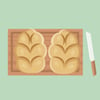Question:
My doctor recently ordered me off wheat. What do I do after Kiddush on Shabbat? Is there something else which I should eat instead of bread?
Answer:
First of all, let's understand why Kiddush must normally be followed by bread. The Talmud provides us this rule, and the Tosafists saw this verse as its basis: And you shall declare the Shabbat a delight –Isaiah 28:13. They interpret the verse as follows: "You shall declare the (sanctity of the) Shabbat"—meaning, say the Kiddush—when you "delight"—meaning when you eat your delightful Shabbat meal.
Accordingly, by making Kiddush alone, you have not fulfilled your obligation. After all, what delight is there in drinking down a cup of wine and hitting the sack? There has to be a meal along with it. The question is, what constitutes a meal?
Throughout Halacha, bread is considered the mainstay of a meal. To be considered bread for our purposes, it must be made of one of the five grains—wheat, spelt, barley, oat, or rye.
So here's a possible solution: If you have been put on a low-gluten diet, spelt has significantly lower gluten than wheat. Many kosher bakeries sell spelt challah. If they don't, there are plenty of good recipes. It may be a little more difficult to bake, since gluten is what holds the dough together, but it can be just as tasty.
If you cannot tolerate any gluten (for example, if you suffer celiac disease), oat challah may be the solution. Here’s our favorite recipe. Oats have no gluten, but oat challah is a little more challenging to bake. Even then, a small minority of celiac patients also react to oats—likely due to cross contamination with other grains in the fields or in the distribution channels. If your doctor recommends you stay away from oats, there is still yet another solution:
After Kiddush, refill your cup and have a largish l'chaim. Drinking a revi'it (2.9 fl oz) of wine or grape juice (but not beer or schnapps) can also be considered a delightful meal for these purposes. Bear in mind that since you are not partaking of the bread you do not make the HaMotzi or full grace after meals. Instead, you say the appropriate blessings for your food and drink before and after eating.
Remember, the purpose of the Shabbat meals is to enjoy our special day with G‑d, and not, G‑d forbid, to suffer. So don't feel bad if your challah looks a little bit different from everyone else's or if you are drinking wine instead of eating challah. You too are fulfilling this mitzvah, just without hurting yourself.
Shabbat Shalom!
Sincerely yours,
Rabbi Menachem Posner







Join the Discussion